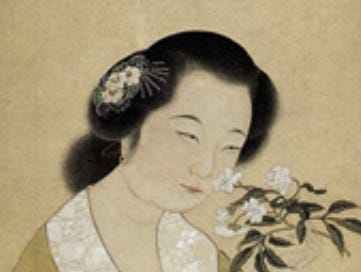"Your perfume is as
Subtle as the odor of blackberry blossoms.
In the slow end of autumn
You are white as the coming snow,
And frail as transparent jade."
- Li Qingzhao
There must have been something special in how Li Qingzhao lived. It was there in how she saw the world. As a poet, her work exuded a particular uniqueness. Perhaps it was the strength of her character, an ability to love even while knowing loss was inevitable. Or maybe it was in how she captured the feelings of life and seasons. But whatever it may have been, Li stood out in a time and place where women typically didn't.
Li was born in 1084 during the Song Dynasty, a largely peaceful era in China. As culture often follows society's focus, in the calm that prevailed, a thriving economy emerged alongside a society steeped in art and education. Cities hummed with the soft rustle of silk robes and turning book pages. In Kaifeng, the imperial capital where Li grew up, bookshops spilled onto stone streets, scholars recited poetry in teahouses fragrant with orchid blossoms, and calligraphers pressed inked brushes to scrolls with the kind of care reserved for holy acts. This was a world where thoughtful creativity was currency.
Growing up in such an environment and in a home with a father who was a respected scholar and government official, and a well-read mother, Li began composing poems early. People praised her writing even in those early years. And Li, who was also deeply competitive, worked hard to develop her craft. At 17, she published her first writing. It marked the beginning of a career in which she would become a master of ci poetry, a lyrical form composed to music, traditionally written by men. Li would transform it.
But before all the success, Li's life experienced an important change a year later when she married a man arranged by her parents. The couple would have a loving and playfully competitive marriage. As Li would write,
"It happens that I have a good memory, and in the evenings after dinner we would sit in our hall named Returning Home and brew tea. We’d point to a pile of books and, choosing a particular event, try to say in which book, which chapter, which page, and which line it was recorded. The winner of our little contest got to drink first. When I guessed right, I’d hold the cup high and burst out laughing until the tea splattered the front of my gown. I’d have to get up without even taking a sip. Oh, how I wished we could grow old living like that!"
But this golden chapter of life would not last. In 1127, a former ally invaded the northern part of the Song empire. They swept through the territories, sacked the capital, and, in what came to be known as the Jingkang Incident, captured the emperor, his heir, and thousands of officials and civilians. Kaifeng was pillaged. And Li along with her husband became refugees fleeing south, carrying what they could of their books, scrolls, and artifacts. About the books, Li would write, "I still treasured them as if they were my life itself."
Sadly, during this difficult time, her husband fell ill and died. His death left Li alone, displaced, and grieving the man who had been her love and intellectual partner. She would later write,
"I sink into my pillow,
My robe is soaked with tears.
It isn’t the chill of autumn
That causes me to shiver."
Her poems from this period reflect this tone. Darker, lonelier, full of longing. They stood in stark contrast to the playful brightness of her early verses, capturing the spiritual dislocation of exile, widowhood, and war. Yet still, she wrote.
In the years following her husband's death, she remarried. But unlike her first marriage, this one quickly soured, lasting only about 100 days. Li took the rare and courageous step of filing a lawsuit against him, which sent her to prison during the trial. But she proved successful and divorced him, an act virtually unheard of among women. Afterward, Li likely spent much of her life wandering through the Southern Song territory, living out her final years in poverty and obscurity.
Today, Li is widely regarded as the greatest female poet in Chinese history. About one hundred of her poems survive.
Sources:
Colville, Alex. "Li Qingzhao, Poet, ‘the Most Talented Woman in History’." The China Project, 6 Apr. 2020, https://thechinaproject.com/2020/04/06/li-qingzhao-poet-the-most-talented-woman-in-history/.
Department of Asian Art. "Northern Song Dynasty (960–1127)." The Metropolitan Museum of Art, 1 Oct. 2001, https://www.metmuseum.org/essays/northern-song-dynasty-960-1127.
Egan, Ronald, translator. The Works of Li Qingzhao. Edited by Anna M. Shields, De Gruyter, 2019. OAPEN Library, https://library.oapen.org/bitstream/id/4f210ef9-3d96-49ba-926c-cab1bc502e33/1006618.pdf.
Jiang, Xun. Song Dynasty Poet Li Qingzhao. 18th century. Wikimedia Commons, https://commons.wikimedia.org/wiki/File:Song_dynasty_poet_Li_Qingzhao.jpg.
Li, Ch'ing-chao. Li Ch'ing-chao: Complete Poems. Translated and edited by Kenneth Rexroth and Ling Chung, New Directions, 1979.




